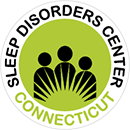Sleep Apnea is a sleep-related breathing disorder that is thought to affect 2 and 4 percent of the adult population. It is diagnosed more often in men, those over 40, and those who are overweight. Sleep apnea is characterized by multiple respiratory pauses during sleep. These pauses, or “apneas” are defined as periods of 10 seconds or longer during which the sleeper stops breathing altogether. Other, milder respiratory events during sleep known as “hypopneas” are defined as periods lasting 10 seconds or longer during which breathing is significantly reduced. Most people with sleep apnea will have periods of abnormal breathing that last between 30 and 40 seconds more than 400 times per night. So the average person with sleep apnea spends more than 3 hours a night not breathing normally or not breathing at all.
Symptoms Of Sleep Apnea Include :
- Loud snoring
- Waking up with gasping or choking
- Excessive daytime sleepiness
- Witnessed apneas
- Unrefreshing sleep
- Morning headache
- Depressed mood and/or irritability
- Loss of sexual interest, impotence or menstrual irregularities( in women)
- Dry mouth upon awakening
- “Acid stomach” or heartburn at night
- Frequent nighttime urination or even bed wetting
- Unexplained accidents or errors
Sleep Apnea is associated with significant health and safety risks
Hypertension: One review of the medical literature reports that approximately 6 of every 10 people with sleep apnea suffer from hypertension (high blood pressure)
Cardiac arrhythmias: Bradycardia, tachycardia, or rhythms that are abnormal occur in about half of those with sleep apnea.
Stroke: Occurs approximately 10 times more frequently in those with sleep apnea than those without. Hypoxia, a common occurrence in people with sleep apnea, appears to be associated with a number of medical problems. This condition may result in seizure during sleep.
Excessive daytime sleepiness: Sleepiness is a “hallmark” of sleep apnea, and often results in impaired daytime functioning. People with sleep apnea may be at greater risk of accidents or injuries due to fatigue. For example, people with sleep apnea are 5 times more likely to be involved in a fatigue-related motor vehicle accident than healthy individuals.
Death rates: Death rates are higher in those with untreated sleep apnea than those without.
